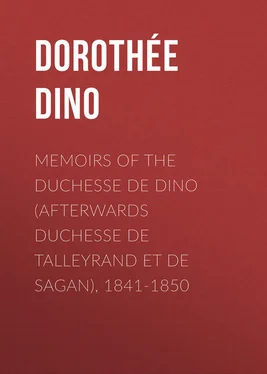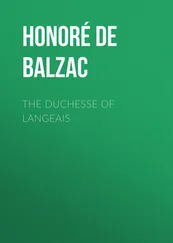Dino Dorothée - Memoirs of the Duchesse De Dino (Afterwards Duchesse de Talleyrand et de Sagan), 1841-1850
Здесь есть возможность читать онлайн «Dino Dorothée - Memoirs of the Duchesse De Dino (Afterwards Duchesse de Talleyrand et de Sagan), 1841-1850» — ознакомительный отрывок электронной книги совершенно бесплатно, а после прочтения отрывка купить полную версию. В некоторых случаях можно слушать аудио, скачать через торрент в формате fb2 и присутствует краткое содержание. Жанр: foreign_antique, foreign_prose, на английском языке. Описание произведения, (предисловие) а так же отзывы посетителей доступны на портале библиотеки ЛибКат.
- Название:Memoirs of the Duchesse De Dino (Afterwards Duchesse de Talleyrand et de Sagan), 1841-1850
- Автор:
- Жанр:
- Год:неизвестен
- ISBN:нет данных
- Рейтинг книги:4 / 5. Голосов: 1
-
Избранное:Добавить в избранное
- Отзывы:
-
Ваша оценка:
- 80
- 1
- 2
- 3
- 4
- 5
Memoirs of the Duchesse De Dino (Afterwards Duchesse de Talleyrand et de Sagan), 1841-1850: краткое содержание, описание и аннотация
Предлагаем к чтению аннотацию, описание, краткое содержание или предисловие (зависит от того, что написал сам автор книги «Memoirs of the Duchesse De Dino (Afterwards Duchesse de Talleyrand et de Sagan), 1841-1850»). Если вы не нашли необходимую информацию о книге — напишите в комментариях, мы постараемся отыскать её.
Memoirs of the Duchesse De Dino (Afterwards Duchesse de Talleyrand et de Sagan), 1841-1850 — читать онлайн ознакомительный отрывок
Ниже представлен текст книги, разбитый по страницам. Система сохранения места последней прочитанной страницы, позволяет с удобством читать онлайн бесплатно книгу «Memoirs of the Duchesse De Dino (Afterwards Duchesse de Talleyrand et de Sagan), 1841-1850», без необходимости каждый раз заново искать на чём Вы остановились. Поставьте закладку, и сможете в любой момент перейти на страницу, на которой закончили чтение.
Интервал:
Закладка:
"Lady Jersey is anxious for her daughter to marry Nicholas Esterhazy. The young people are extremely fond of one another. Paul Esterhazy is trying to get out of the matter which is difficult.
"The Prince de Joinville was most warmly received at the Hague. The King and Queen overwhelmed him with marks of violence. What impression will this make at St. Petersburg?
"M. de Flahaut has been nominated as Ambassador to Vienna. The proposal has been accepted but with no great warmth. In any case there can be no further changes or nominations, for the London post remains vacant, as Lord Palmerston will not conclude the eastern problem, and nothing will be done until Sainte Aulaire has gone to London."
Vienna, June 17, 1841. – Charles de Talleyrand came yesterday to tell me the latest news from Paris. Marshal Soult's quarrel has been settled: he will remain in office, and his son-in-law will go to Rome as ambassador; the Marshal is to receive 600,000 francs in payment of some loan which he professes to have made to the State. The Turko-Egyptian business is settled: the act will be ratified and sent to Alexandria, and the five Courts will meet at London if they have not already come to an agreement.
Vienna, June 18, 1841. – Yesterday evening I went to hear a German tragedy and then to tea with Prince Metternich. At the end of the evening the Prince began to talk over a round table, and was most kind and interesting. Except on Sundays when they are at home he sees very little society, and his house in my opinion is the pleasanter in consequence. Marshal Marmont is there every day.
Vienna, June 19, 1841. – Yesterday I went with my sisters to visit the Imperial Picture Gallery. I am surprised that it is not better known, for it contains some most beautiful works. It lies outside the town in a palace called the Belvedere, which was built by Prince Eugène of Savoy. The interior is very handsome.
I dined at the house of Princess Paul Esterhazy and with Prince and Princess Metternich and their daughter, Prince Wenzel, Lichtenstein, Schulenburg, Lord Rokeby, Count Haugwitz and Baron von Hügel. Princess Esterhazy was very amusing with her fear of Lady Jersey as mother-in-law. The marriage, however, has not been definitely settled.
Vienna, June 21, 1841. – I am delighted to hear that you like Fenelon's Letters. 30 30 Extract from a letter.
They explain everything in a form which illustrates the faithful and courageous devotion paid to this kindly and holy Archbishop by the courtiers of the great King. He is able to give a charm and a grandeur to religion, to make it at once simple and attractive by its loftiness. If to read the story with his intercourse with his friends does not produce conversion, at any rate no one can fail to derive from it a love of goodness, of beauty, and a desire to lead a better life as a prelude to a good death.
The History of Port Royal by Sainte-Beuve is certainly interesting. It is a great subject, but treated in a style which is neither sufficiently serious nor simple, and cannot worthily represent the austere and imposing figures of Jansenism.
Vienna, June 25, 1841. – I propose to start next Wednesday and from Prague to take the road which will bring me back to my nieces in Saxony; from thence I shall go by Lusatia to upper Silesia to see my sister Hohenzollern who will be there at that time, and shall afterwards go to my own property at Wartenberg where I hope to be on July 26.
Vienna, June 26, 1841. – Yesterday I dined with Prince Metternich; only the family were present. I went on to the theatre and afterwards to the Volksgarten , a kind of Tivoli, where Strauss plays his waltzes, where Styrians sing and all the good or bad society of Vienna meets during this season. My sisters who were with me, then took me to their house where we had tea.
Lord Palmerston rouses much discontent as he continually raises some new obstacle when the Egyptian question is at the point of conclusion. His conduct is strangely tactless. All kinds of conjectures are in the air and much exasperation was displayed where I was dining yesterday.
Vienna, June 28, 1841. – The weather here yesterday was most remarkable: after midday a violent wind arose which raised clouds of dust, completely shrouding the town and suburbs; the burning wind was a real sirocco which withered and exhausted every one.
I went to mass at the Capuchin church to say goodbye to Father Francis who gave me his blessing. I then returned home to wait for Marshal Marmont who had asked permission to read me forty pages from the manuscript of his memoirs which he has devoted to justifying his conduct during July 1830. I was unable to refuse. I learnt nothing particularly fresh, as I knew all the remarkable facts which clearly prove that the imbecility of the Government was incomparable and that the Marshal was very unfortunate in being called to conduct a business both ill-devised and ill-prepared; so he needed no justification in my eyes, but I was interested to hear full details of the scene with the Dauphin, of which I knew nothing and the words and gestures of which pass the powers of imagination. 31 31 This lamentable scene, the sad event which marked the last evening which Charles X. and the Dauphin spent at Saint-Cloud, is related at length in the memoirs of the Duc de Raguse, to which reference is here made (Vol. VIII. Book XXIV.), and is partly reproduced in a book by M. Imbert de Saint-Amand, entitled The Duchesse de Berry and the Revolution of 1830 , which appeared in 1880.
The reading was interrupted by various reflections and was further prolonged for the reason that the Marshal reads slowly and continually stammers and hums and haws. His delivery is extremely laboured.
I then went with my brother-in-law, Schulenberg, to dine with the Countess Nandine Karolyi at Hitzinger, a village near Schönbrunn. I was by no means anxious to go but as she had been so kind as to ask me, I could not refuse. She lives in one half of a charming cottage which belongs to Charles von Hügel, the traveller whose infatuation for Princess Metternich drove him to spend seven years in the East. On his return he built this house and has filled it with curiosities from India. He lives in one half of the house and Nandine in the other. It is prettily situated, surrounded with flowers and looks quite English. I was by no means delighted with the dinner. The mistress of the house is eccentric, an exaggeration of the Vienna type, and the gentlemen about her corresponded. I went away as soon as possible and spent an hour in farewell talk with Princess Louise of Schönburg.
Vienna, June 29, 1841. – Yesterday at night-fall I went with my sisters, Schulenberg and Count Haugwitz to the Volksgarten where the whole of Vienna does its best to enjoy the dew amid clouds of tobacco smoke. Fireworks and Strauss were the amusements provided. One positive refreshment was the ices, of which an enormous quantity seemed to be consumed. The population of Vienna are quiet, well-dressed, entirely respectable and very mixed, for in these amusements the aristocracy take part. There was no sign of a policeman, nor were any needed.
Vienna, June 30, 1841. – I am leaving Vienna this evening. The heat continues to be extreme and will make my journey very unpleasant. I shall not send off this letter until I reach Dresden; correspondence is more certain outside the Austrian states. I do not mind people reading my expressions of affections, but my impressions and opinions are another matter. I trust therefore that I have been prudent in this respect during my stay here.
Tabor, July 1, 1841. – I left Vienna yesterday at seven o'clock in the evening. In the afternoon I had a visit from Prince Metternich. He was kind and confidential, and the idea that he has deteriorated is quite wrong. Perhaps he expresses himself more slowly and vaguely than he used to do, but his ideas are in no way confused, his opinions are firm and decided, he remains moderate and gentle in temper, and in short is entirely himself. He strongly advised me to return by way of Johannisberg, whither he will go from Königswart in the month of August and stay until September. His wife urged me to do the same and showed me the utmost kindness. Her beauty strongly appeals to me, though it is a style often spoilt by harshness of voice, common manners or vulgar language. She is generally disliked at Vienna to my astonishment, for I think she is good-hearted though unpolished. Several people kindly came to say good-bye at the last moment. My sisters, with Schulenburg and Count Maurice Esterhazy, who is the smallest and liveliest of the family, accompanied me two leagues beyond Vienna, where my travelling carriage was waiting for me. Count Esterhazy is the same who was at Paris; he was afterwards attached to the Austrian embassy at Berlin, where I last saw him. This post he left a few days before I came to Vienna, as he is going to Italy, where his mother is now lying ill. He is a close friend of my sisters', somewhat malicious like all very small men, but a pleasant talker and far more civilised and in better taste than people generally are at Vienna, especially the men, who are usually very ignorant. On the whole I prefer Berlin to Vienna society. At Vienna people are richer and more high and mighty and their naturalness is affected: at Berlin I admit there is more affectation, but there is much more culture and intellectualism. Life at Vienna is extremely free and easy: people do anything they please without being regarded as eccentric, but though no one is surprised at his neighbour's doings slander is as commonly current as elsewhere, and I am ready to assert that a false good nature of a very dangerous kind is prevalent. At Berlin life is more formal and more attention is paid to a certain decorum: the consequence is some stiffness, but words are more carefully weighed, and as there is less reason for backbiting there is more real kindliness. Personally I have nothing but praise for the hospitality of either town and remain entirely grateful to them both. I was especially struck at Vienna by the manner in which men and women commonly address one another by their baptismal names; however slight acquaintanceship is, provided people belong to the same clique, family names disappear, and to use them is thought a mark of bad taste. Women are constantly kissing one another and invariably upon the lips, which I think horrible. Men continually kiss ladies' hands, and at first sight society seems to be composed of brothers and sisters. Perhaps twenty people in speaking to me or in reference to me would say "Dorothea;" those less familiar would say "Duchess Dorothea;" the most formal would use the term "dear Duchess," but no one would say "Madame" or "Madame la Duchesse." I am astonished that anything remains of my hands; and my cheeks, which I try to substitute for my lips, have suffered a perfect martyrdom. The coquetry of the women at Vienna is obvious, nor is any attempt made to disguise it, though the churches are full and the confessionals besieged; but there is no appearance of real devotion, and the sincere and active faith of the Royal Family has no influence upon society, which displays its independence by habitual opposition to the Court.
Читать дальшеИнтервал:
Закладка:
Похожие книги на «Memoirs of the Duchesse De Dino (Afterwards Duchesse de Talleyrand et de Sagan), 1841-1850»
Представляем Вашему вниманию похожие книги на «Memoirs of the Duchesse De Dino (Afterwards Duchesse de Talleyrand et de Sagan), 1841-1850» списком для выбора. Мы отобрали схожую по названию и смыслу литературу в надежде предоставить читателям больше вариантов отыскать новые, интересные, ещё непрочитанные произведения.
Обсуждение, отзывы о книге «Memoirs of the Duchesse De Dino (Afterwards Duchesse de Talleyrand et de Sagan), 1841-1850» и просто собственные мнения читателей. Оставьте ваши комментарии, напишите, что Вы думаете о произведении, его смысле или главных героях. Укажите что конкретно понравилось, а что нет, и почему Вы так считаете.












